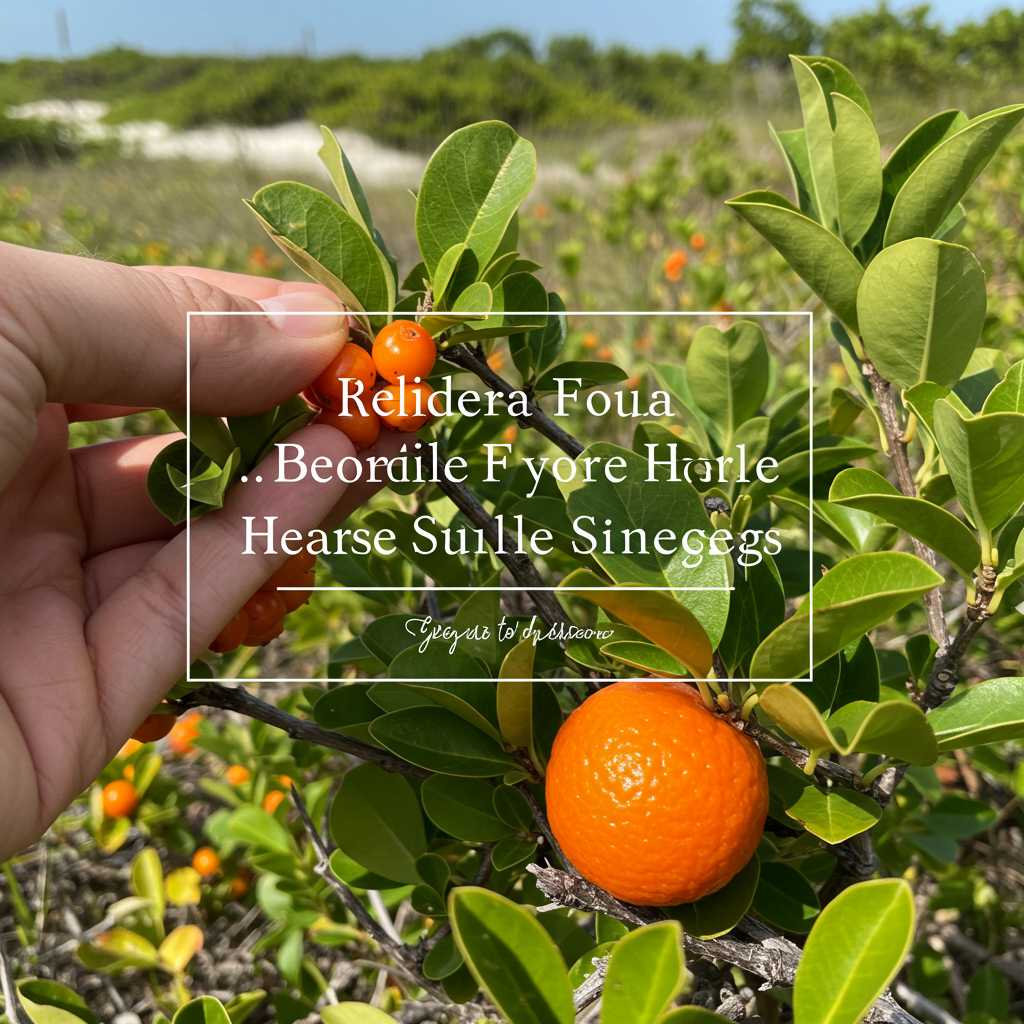This comprehensive guide explores the fascinating world of Florida edible plants, providing foragers with the knowledge to safely identify, harvest, and enjoy nature’s bounty. From common backyard weeds to hidden forest treasures, discover the diverse edible flora that Florida offers.
Florida, with its diverse ecosystems ranging from subtropical forests to coastal dunes, boasts a surprising abundance of edible plants. Foraging, the practice of gathering wild food for consumption, offers a unique connection with nature and a chance to savor fresh, flavorful ingredients. However, responsible foraging requires careful identification and an understanding of sustainable harvesting practices. This guide serves as your gateway to exploring the world of Florida’s edible plants, equipping you with the knowledge necessary for a safe and rewarding foraging experience.

Identifying Florida’s Edible Treasures
Common Backyard Edibles
Many edible plants can be found right in your backyard! Purslane, with its succulent leaves, is a rich source of omega-3 fatty acids. Dandelion, often dismissed as a weed, offers edible leaves, flowers, and roots, each with its own unique flavor profile. Clover, another common lawn resident, has edible flowers and leaves that can be added to salads or used as garnishes.
Coastal Delights
Florida’s extensive coastline offers a bounty of edible plants. Seagrape, found along sandy beaches, produces tart berries perfect for jams and jellies. Saltwort, with its salty, succulent leaves, makes a refreshing addition to salads. Beach sunflower, with its bright yellow blossoms, offers edible seeds and petals.
Forest Finds
Venturing into Florida’s forests reveals a treasure trove of edible plants. Wild blueberries, with their sweet and tangy flavor, are a delicious treat. Mushrooms, such as chanterelles and morels (with proper caution and expert identification), offer a unique culinary experience. Pawpaws, often called “custard apples,” provide a creamy, tropical-flavored fruit.
Safe and Sustainable Foraging Practices
Accurate Plant Identification
Accurate plant identification is paramount for safe foraging. Use reputable field guides, cross-reference multiple sources, and consider taking a foraging class with a local expert. Never consume a plant unless you are 100% certain of its identity.
Ethical Harvesting
Sustainable harvesting practices ensure the continued health of plant populations. Harvest only a small portion of a plant, leaving enough for it to regenerate. Avoid harvesting from areas near roads or polluted sites. Obtain permission before foraging on private property.
Preparing Wild Edibles
Proper preparation techniques are crucial for enjoying wild edibles. Thoroughly wash all foraged plants to remove dirt, insects, and potential contaminants. Some plants may require specific cooking methods to render them safe and palatable.
Potential Hazards and Precautions
While foraging can be a rewarding experience, it’s essential to be aware of potential hazards. Some plants are poisonous and can cause severe illness or even death if ingested. Poison ivy, oak, and sumac are common irritants that should be avoided. Always err on the side of caution and never consume a plant unless you are absolutely certain of its identity.
Allergic Reactions
Some individuals may experience allergic reactions to certain wild plants. Introduce new foraged foods gradually and in small quantities to monitor for any adverse reactions.
Florida Foraging Regulations and Resources
Know the Laws
Familiarize yourself with local, state, and federal regulations regarding foraging. Some areas may have restrictions on harvesting specific plants or require permits for foraging activities.
Local Foraging Groups and Experts
Connecting with local foraging groups and experts can provide invaluable knowledge and guidance. These groups often offer guided walks, workshops, and online forums where foragers can share their experiences and learn from one another.
Frequently Asked Questions (FAQs)
Q: Where can I find reliable information about Florida edible plants?
A: Reputable field guides, online databases, and local foraging experts are excellent resources for identifying edible plants.
Q: What should I do if I accidentally ingest an unknown plant?
A: Contact the Poison Control Center immediately.
Q: Is it legal to forage in Florida state parks?
A: Foraging regulations vary between state parks. It’s crucial to check specific park regulations before harvesting any plants.
Q: When is the best time to forage for edible plants in Florida?
A: The optimal foraging season varies depending on the specific plant. Many plants are abundant in spring and fall.
Q: How can I tell the difference between a poisonous plant and an edible one?
A: Never rely solely on visual identification. Consult multiple sources and seek expert guidance when identifying plants.
Expanding Your Foraging Knowledge: Beyond the Basics
Once you are comfortable with identifying common edible plants, consider expanding your foraging repertoire to include less common species. Learn about the nutritional properties of different wild edibles and explore creative ways to incorporate them into your diet. Foraging can be a lifelong journey of discovery, offering a continuous supply of fresh, flavorful ingredients.
The Joy of Foraging in Florida
From the abundant greenery of its forests to the sun-drenched shores of its coastline, Florida provides ample opportunities for foraging adventures. With careful preparation, responsible harvesting practices, and a deep respect for nature, you can unlock the bounty of Florida’s edible plants. Embrace the thrill of discovering nature’s hidden treasures and savor the unique flavors that wild foods offer.
Conclusion
Foraging for Florida edible plants offers a rewarding way to connect with nature and enjoy fresh, locally sourced food. By adhering to safe and sustainable practices, continuous learning, and leveraging available resources, you can confidently explore the diverse edible flora of Florida and embark on a fulfilling foraging journey. Remember, accurate plant identification is crucial for preventing accidental poisoning. Always err on the side of caution and consult with experts when necessary. Happy foraging!

